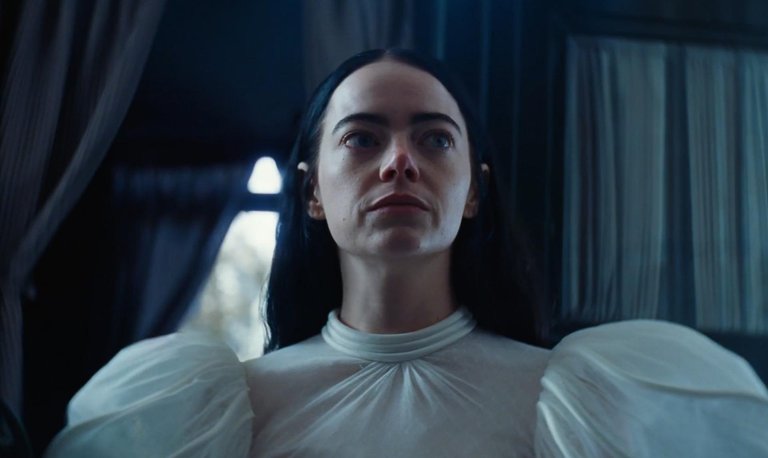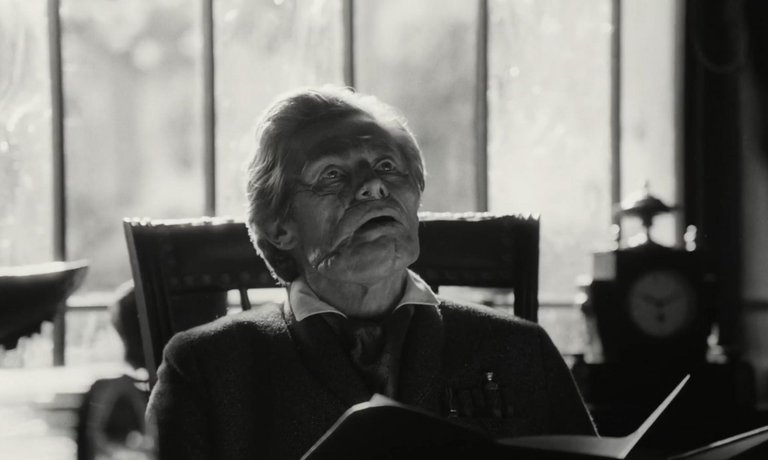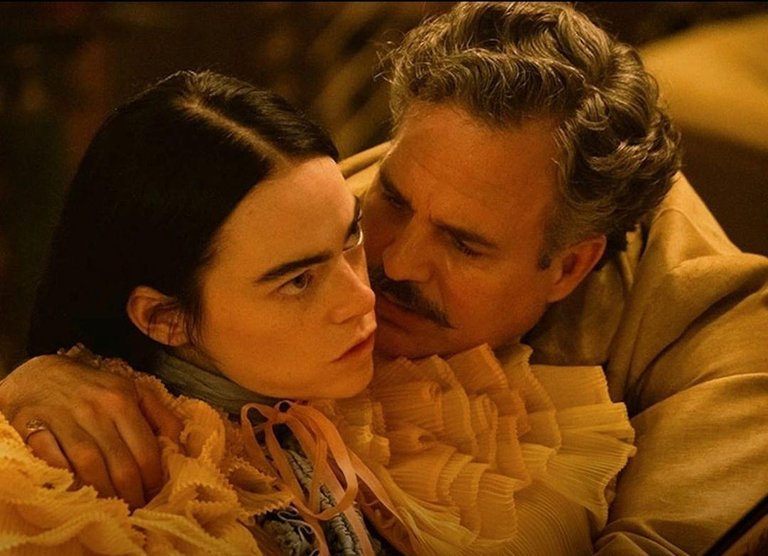Review: Poor Things (*An anthropological view*)
Tenía tiempo sin mirar un film, confieso que tengo una larga lista de películas por ver y ayer acá en casa en compañía de @zullyscott y @andresdz decidimos comenzar hacer check✔ en la lista y disfrutamos de POOR THINGS ahora bien, he decido hacer un review un poco diferente, apenas comentaré aspectos de la película tales como director, fotografía y reparto, ya que son datos que existen en internet y pueden ser googleados con suprema facilidad, en cambio, me esforzaré en proporcionar una mirada antropológica en explicar cómo elementos presentes en la obra pueden suscitar reflexiones interesantes. Así, sin más preámbulos vamos al meollo del asunto.

Bella Baxter
En el caso de que aun no hayas visto POOR THINGS descuida que no habrá peligro de spoilers en las próximas líneas. Pero, para no partir sin un contexto previo comenzaré con una breve sinopsis, un comentario, una puntuación y por último una mirada antropológica.
SINOPSIS:
La historia comienza entorno a la vida de la señorita Baxter (Emma Stone), la hija de un muy poco ortodoxo médico llamado Godwin Baxter (Williem Dafoe), quien la sobre protege, cosa que parece alimentar la insaciable sed de conocer y experimentar el mundo. La historia da un vuelco cuando el abogado Duncan Wedderburn (Mark Ruffalo) aparece en la vida de Bella Baxter y él conoce todo lo que puede del mundo, dándose cuenta de todo lo que compone la sociedad.
OPINIÓN:
Personalmente considero que es una gran película en muchos aspectos, de construcción barroca puesto que sobreabundan elementos tal cual las catedrales europeas del los años 1600. Una jugada por parte del director que deambula entre lo extraño y lo surrealista. La fotografía es bastante curiosa, juego lumínico interesante y sumamente curioso, desde la escala de grises hasta los colores más vibrantes la película cuenta una narrativa evolutiva.
La narración de la historia de los personajes en especial el de Bella Baxter es un camino de extrañeza y descubrimiento del mundo y por consiguiente de si mismo en relación con lo demás. Retorcidísimo pero fantástico creo que es una jugada por lo menos interesante, aunque, me parece excesiva la cantidad de escenas sexuales, creo pudo haber jugado más a la sugestión aunque la lógica del film no pretende sugestionar nada, en cambio parece que lo evidente sobrepasa todo limite, dejando espacio solo a reflexiones ulteriores.
Una lluvia de mensajes que parecen caer como chubasco de conciencia social, evidenciando sesgos y sobre todo lo absurdo del comportamiento humano. No creo que sea una película que a todos les pueda agradar, es una jugada arriesgada que a mi parecer ha tenido buenos resultados, en los premios de la academia si no mal recuerdo, se llevó 4 premios siendo el más notable el Oscar de Emma Stone a mejor actriz. Creo que su papel fue increíble.

Godwin Baxter
Puntuación:
✨✨✨8/10✨✨✨

Bella Baxter and Duncan Wedderburn
Una mirada Antropológica:
La pregunta antropológica por excelencia es: ¿Qué es el hombre?, pero, para evitarnos malentendidos quedémonos con la pregunta "¿Qué es el ser humano?" claramente hay cientos de respuestas parciales, es decir, depende de la ciencia que se formule la interrogante encontraremos una respuesta, por ejemplo, si pensamos en la biología, diremos que el ser humano es un ser vivo, pero, eso es tan solo una respuesta parcial.
En sentido filosófico, no es tan obvio el definir una respuesta a la pregunta por el ser del humano. Aunque no me dedico a la antropología filosófica, creo que puedo proporcionar una mirada reflexiva en este sentido valiéndome de los elemento de POOR THINGS
Dos cosas que son indiscutiblemente inherentes de la condición humana es el lenguaje y el encuentro con el otro, de hecho, ambas cosas se retroalimentan y ambas configuran nuestro modo de pensar y nuestro modo de concebir el mundo. Bella Baxter desde el inicio de la película esta de cara a ambos elementos y va configurando su desarrollo en función de como estas cosas permean su ser.
En principio no puede definirse por carencia de un sistema de lenguaje, el mismo lenguaje que le permite construir un mundo y la gama de colores presente en la fotografía parece responder a su cosmovisión. Creo que los guionistas pensaron los diálogos en función de la construcción de una interpretación y autopercepción gracias a la referencias que Bella ha ido adquiriendo.
Eso que somos es condicionado no por lo que vivimos o experimentamos, sino por lo que reflexionamos en torno a lo que nos sucede, pues con Bella experimentando el mundo en sus diversos matices sin juicios o culpas nos hace pensar que una actitud vitalista nos hace contemplar la vida con más disposición de espiritu, así que si Nietzsche hubiese visto este film, creo se hubiese sentido encantado.
Ahora bien, la cuestión del espiritu, el alma o como sea que le prefieras llamar a eso que parece vivificarnos ¿Dónde queda? ¿Te lo has preguntado? En la mente, en algún rincón del cuerpo, si no vino a tu mente tal pregunta y ya viste la película, piensa en un instante ¿Hay un donde? en el alma de Bella Baxter.
Quiero terminar esta visión antropológica en torno al film con un par de preguntas:
- ¿Qué hace que Bella Baxter sea Bella Baxter? ¿Su cuerpo? ¿Su mente?
Aunque si aun no has visto esta película es buen ejercicio que pienses en tales cuestiones llevándolo a ti mismo y cuando veas el film recuerda estas cuestión, pues parece que es un asunto por lo menos interesante de pensar. La antropología filosófica es esa área del saber que se pregunta por misterios del ser humano que quizás nunca tengan una respuesta.
La película la he disfrutado en gran parte por todo lo que me hizo pensar, estoy pensando seriamente en verla nuevamente y penar en cosas menos generales y reflexionar asuntos puntuales en torno a cosas que el film propone.
Y tú que viste la película cuéntame ¿te gustó o no? nos vemos en la sección de comentarios.
Mantente curioso!
ENGLISH VERSION (click here!)
I had some time without watching a film, I confess that I have a long list of movies to watch and yesterday here at home with @zullyscott and @andresdz we decided to start checking✔ the list and we enjoyed POOR THINGS well now, I have decided to make a review a little different, I will hardly comment on aspects of the film such as director, cinematography and cast, as these are data that exist on the internet and can be googled with supreme ease, instead, I will strive to provide an anthropological look at explaining how elements present in the work can raise interesting reflections. So, without further ado, let's get to the heart of the matter.

Bella Baxter
In case you haven't seen POOR THINGS yet, don't worry, there will be no danger of spoilers in the following lines. But, in order not to start without a previous context I will begin with a brief synopsis, a commentary, a punctuation and finally an anthropological look.
SYNOPSIS:
The story begins around the life of Miss Baxter (Emma Stone), the daughter of a very unorthodox doctor named Godwin Baxter (Williem Dafoe), who overprotects her, something that seems to feed the unquenchable thirst to know and experience the world. The story takes a turn when lawyer Duncan Wedderburn (Mark Ruffalo) shows up in Bella Baxter's life and he learns all he can about the world, realizing everything that makes up society.
OPINION:
Personally I consider it a great film in many ways, baroque in construction as there is an overabundance of elements such as the European cathedrals of the 1600s. A move on the part of the director that wanders between the bizarre and the surreal. The cinematography is quite curious, with an interesting and extremely curious play on light, from grayscale to the most vibrant colors, the film tells an evolving narrative.
The narration of the story of the characters, especially that of Bella Baxter, is a path of strangeness and discovery of the world and therefore of oneself in relation to others. Twisted but fantastic I think it is at least an interesting move, although I find the amount of sexual scenes excessive, I think it could have played more to suggestion, although the logic of the film is not intended to suggest anything, instead it seems that the obvious exceeds all limits, leaving room only to further reflections.
A shower of messages that seem to fall like a downpour of social conscience, highlighting biases and above all the absurdity of human behavior. I do not think it is a film that everyone can like, it is a risky move that in my opinion has had good results, in the academy awards if I remember correctly, took 4 awards being the most notable the Oscar for best actress Emma Stone. I think her role was incredible.

Godwin Baxter
Rating
✨✨✨8/10✨✨✨

Bella Baxter and Duncan Wedderburn
An anthropological look:
The anthropological question par excellence is: What is man, but, to avoid misunderstandings let us stay with the question "What is the human being? " clearly there are hundreds of partial answers, that is, depending on the science that the question is formulated we will find an answer, for example, if we think of biology, we will say that the human being is a living being, but, that is only a partial answer.
In a philosophical sense, it is not so obvious to define an answer to the question of the human being. Although I do not engage in philosophical anthropology, I believe I can provide a thoughtful insight in this regard by drawing on the elements of POOR THINGS.
Two things that are indisputably inherent to the human condition are language and the encounter with the other, in fact, both feed back on each other and both shape our way of thinking and our way of conceiving the world. Bella Baxter from the beginning of the film faces both elements and shapes her development according to how these things permeate her being.
In principle, she cannot define herself because she lacks a language system, the same language that allows her to build a world and the range of colors present in the photograph seems to respond to her worldview. I believe that the screenwriters thought the dialogues in function of the construction of an interpretation and self-perception thanks to the references that Bella has been acquiring.
That which we are is conditioned not by what we live or experience, but by what we reflect on what happens to us, because with Bella experiencing the world in its various shades without judgment or blame makes us think that a vitalist attitude makes us contemplate life with more disposition of spirit, so if Nietzsche had seen this film, I think he would have been delighted.
Now, the question of the spirit, the soul or whatever you prefer to call that which seems to vivify us, where is it? Have you ever asked yourself? In the mind, in some corner of the body, if such a question did not come to your mind and you have already seen the movie, think for a moment, where is it? in Bella Baxter's soul.
I want to end this anthropological vision around the film with a couple of questions:
- What makes Bella Baxter Bella Baxter? Her body? Her mind?
Although if you have not yet seen this film it is a good exercise to think about such questions by taking it to yourself and when you watch the film remember these questions, as it seems to be at least an interesting thing to think about. Philosophical anthropology is that area of knowledge that wonders about mysteries of the human being that may never have an answer.
I enjoyed the film in large part for all that it made me think, I am seriously thinking of watching it again and think about less general things and reflect on specific issues around things that the film proposes.
And if you saw the movie, tell me, did you like it or not? See you in the comments section.
Translated with DeepL.com (free version)
Stay curious!

| X | Instagram | Medium |Telegram | LinkedIn | INLEO |
Posted Using InLeo Alpha
Congratulations @filoriologo! You have completed the following achievement on the Hive blockchain And have been rewarded with New badge(s)
Your next target is to reach 6750 replies.
You can view your badges on your board and compare yourself to others in the Ranking
If you no longer want to receive notifications, reply to this comment with the word
STOPCheck out our last posts: